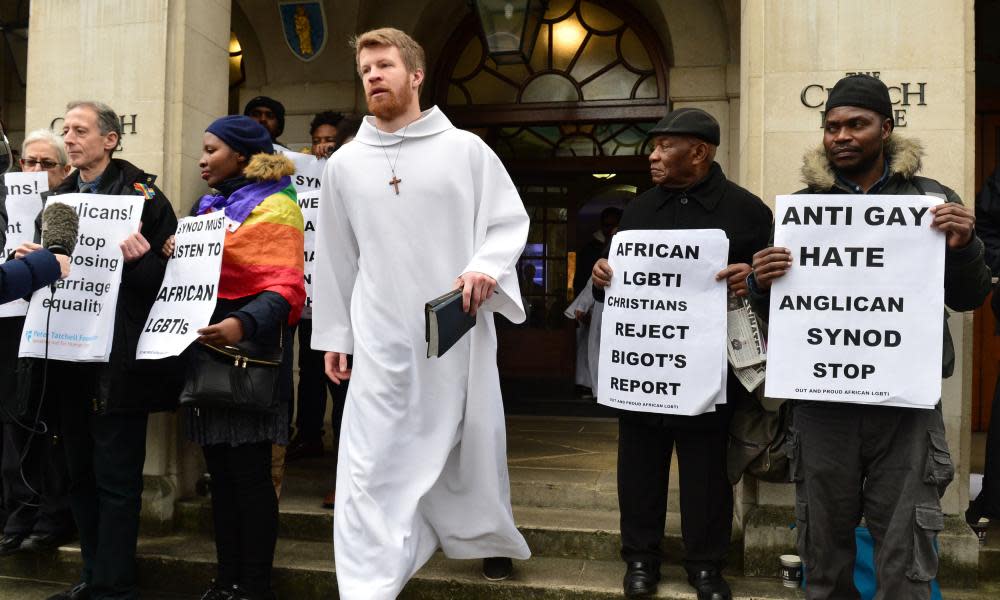Gay activist claims she was spiritually abused by evangelical churches

A leading gay activist in the Church of England who says she endured “spiritual abuse” because of her sexuality is urging the church to ensure the safety of LGBTI Christians.
Jayne Ozanne, whose experience in a charismatic evangelical church led to a breakdown, has warned that the high rate of suicide, self-harm and depression among LGBTI Christians will continue unabated unless spiritual abuse is tackled.
Churches risk becoming places of “turmoil and pain”, she added.
Ozanne is also calling on the C of E to reject the practice of conversion therapy as unethical and harmful in a motion to be debated at its ruling body, the general synod, which meets in York in July.
Spiritual abuse “can cause lasting damage to victims, particularly in relation to their sense of identity, wellbeing and mental health”, she said. The government’s current fourfold definition of abuse – physical, sexual, emotional abuse and neglect – should be broadened to include spiritual abuse, she added.
Ozanne said: “Spiritual abuse is quite commonplace in evangelical charismatic churches. The ‘healing therapy’ I went through was about trying to deliver me from my homosexuality.
“It made me feel ashamed of my sexuality, guilty, sinful, desperate – but most of all deeply depressed, which led to a breakdown. I was unable to function. I know so many people who have been there.
“I don’t want to see another young person take their life, or end up in hospital as I did with my body cracking under the strain. We need to put an end to this practice and instead celebrate who we are.”
In a paper, Spiritual Abuse – The Next Great Scandal for the Church, published this week by the Royal College of Psychiatrists, Ozanne said the issue was “particularly pertinent to those who struggle – due to their religious beliefs – with questions of sexual or gender identity.
“Sadly, these individuals are subjected to the worst forms of spiritual abuse by groups of individuals at the time that they require unconditional support and affirmation. This has the added complication that their once safe place of refuge, their church, becomes a place of turmoil and pain, where those they have trusted are the source of their abuse.
“The most damaging practice is often the misuse of scripture during times of prayer ministry, where passages are quoted that can make the individual receiving prayer feel that their failure to be healed is due to their sin.”
Her chief concern was the “group model” of spiritual abuse, in which “a group dynamic is created which can encourage and foster abusive behaviour. It is unique to certain types of churches and network groups, particularly those that believe in the importance of being ‘baptised in the Holy Spirit’.”
She added: “The combination of their unquestioned teaching on the Holy Spirit coupled with their common worship dynamic can lead to a variety of abusive practices.”
Ozanne’s Synod motion says conversion therapy, which attempts to change or suppress sexual orientation, “has no place in the modern world, is unethical, harmful and not supported by evidence”.
In a background paper, Ozanne says sexual orientation and gender identities are not mental health disorders. However, “exclusion, stigma and prejudice may precipitate mental health issues for any person subjected to these abuses, often sadly perpetrated by religious groups”.
The C of E should be “unequivocal in its condemnation of such harmful practices”. The motion calls for church endorsement of a statement issued in January condemning conversion therapy by the British Association for Counselling and Psychotherapy, the British Psychological Society and the UK Council for Psychotherapy and other bodies.
In the UK, the Samaritans can be contacted on 116 123. In the US, the National Suicide Prevention Hotline is 1-800-273-8255. In Australia, the crisis support service Lifeline is on 13 11 14. Hotlines in other countries can be found here.

 Yahoo News
Yahoo News 
